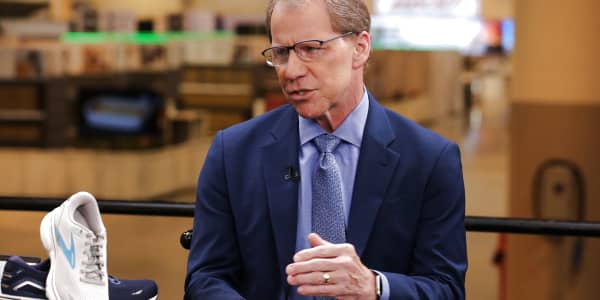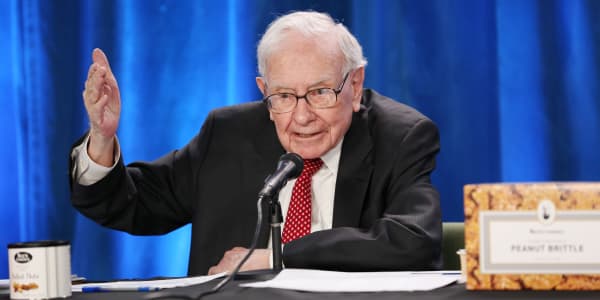Warren Buffett appeared live on CNBC with Becky Quick today, Wednesday, June 24, 2009.
Buffett told us the economy is in a "shambles" with no signs of a recovery anytime soon. He also criticized Apple for not disclosing earlier that CEO Steve Jobs had received a liver transplant.
This is a complete transcript of their conversation:
BECKY QUICK: We are here at Smith & Wollensky where Warren Buffett is paying off last year's winner for this auction. This is, right now there's another auction underway. And this is the tenth year in a row he's been doing this. Warren, we want to thank you very much for joining us.
WARREN BUFFETT: It's a pleasure.
BECKY: You've been doing this for 10 years, raising money for the . Why the Glide Foundation?
BUFFETT: I think it's probably as remarkable a social organization as there is in the country, and it's run by Cecil Williams, who, for 45 years, has taken people that have hit bottom and said, 'You're still a worthwhile individual and we're going to do what we can for you in terms of housing, medicine, vocational training and you're going to become the kind of person that you can become.' He believes in people and he carries it out every day and I've never found a more effective place at lifting people from bottom.
BECKY: This year's winner, last year's winner showing up today, Zhao Danyang, who is someone who paid 2.1 million dollars. That's a remarkable amount of money that's out there. Last year, obviously, the markets were in a very different place than they are this year. The auction is underway. I know the bidding goes through Sunday. (Note: Bidding actually ends this coming Friday at 10p ET). Do you think someone can bid as much as you saw last year?
BUFFETT: (Laughs.) Well it surprised me last year. They have qualified a number of bidders that are good for very big figures. They make sure of that beforehand. So we'll see what happens. (Laughs.) Two-point-one million is a pretty good number to shoot for. I hope I don't have to leave a 10 percent tip at the end of the lunch. (Laughs.)
BECKY: The last time we sat down to talk to you was on May 4, and at that point you told us that you think we're in an economic war right now. How much progress do you think we've made in that war?
BUFFETT: Well, it's been pretty flat. I get figures on 70-odd businesses, a lot of them daily. Everything that I see about the economy is that we've had no bounce. The financial system was really where the crisis was last September and October, and that's been surmounted and that's enormously important. But in terms of the economy coming back, it takes a while. There were a lot of excesses to be wrung out and that process is still underway and it looks to me like it will be underway for quite a while. In the (Berkshire Hathaway) annual report, I said the economy would be in a shambles this year and probably well beyond. I'm afraid that's true.
BECKY: We hear people on our air all the time who talk about the 'green shoots' that they're seeing. Are you seeing any of those green shoots?
BUFFETT: (Laughs.) I looked. I wasn't seeing anything. I had a cataract operation on my left eye about a month ago and I thought maybe now I'll be able to see green shoots. We're not seeing them. Whether it's retailing, manufacturing, wherever. We have a big utility operation. Industrial demand is down like we've never seen it for a simple thing like electricity. So it hasn't happened yet. It will happen. I want to emphasize that. But it hasn't happened yet.
BECKY: Earlier this year you also told us that you think Washington and the Obama administration should be paying attention to jobs, that's the number one, jobs and the economy is the number one, the number two, and the number three job that they should be doing. Has there been progress made at all on that front?
BUFFETT: Well, they're doing thing but they take awhile to have an effect. They're doing things on a lot of fronts. But you can't produce a baby in one month by getting nine women pregnant, you know. (Laughs.) It just doesn't work that way. So you can be throwing things at the economy and they will have an impact, but they haven't had much impact yet. And unemployment will go high and it will lag the turn up of the economy.
BECKY: But has Washington done enough that you think they can turn their sights to other problems that exist?
BUFFETT: Well, they've turned their sights to other problems, but this problem is not yet solved. And it's the most important problem we have.
BECKY: It continues to be? You don't think any of the urgency has come away?
BUFFETT: No, I don't think the urgency has come away. The urgency has moved away from a total meltdown of the financial sector which we faced last fall. I've never seen anything like that. But I would give enormous credit to the people there. (Federal Reserve Chairman) Bernanke did a fabulous job. We were right at the point where people lost faith in money-market funds, when commercial paper stopped being issued. People would be having a problem meeting their payroll, very big companies, if that hadn't gotten addressed very quickly. And I give credit to people for doing that. So that part, we've moved past that particular period. We haven't got the economy going again.
SHOULD BERNANKE STAY AS FED CHAIRMAN?
BECKY: You mentioned that you think Ben Bernanke did a good job. Today is an FOMC meeting day. We're going to be hearing more about that at 2:15 today. Do you think Ben Bernanke should be reappointed to a second term?
BUFFETT: I don't see how you could do better. Yeah. He has taken decisive action at a time when really decisive action was needed, and extraordinary action, things that we hadn't done before. If he hadn't of done -- I give the Bush administration credit on this. (Former Treasury Secretary) Hank Paulson. They don't do everything perfectly. Nobody does. And we were getting balls thrown at your head by the hour. You're going to make some mistakes. But they got us through a period that, if we had different people in those jobs, I'm not so sure we would have gotten through.
BECKY: Well now you do have different people on those jobs. You have (National Economic Council Director) Larry Summers, who is advising the president. You have (Treasury Secretary) Tim Geithner who's there. You have Ben Bernanke. What do you think of the troika today?
BUFFETT: I think you've got three very, the people you named are very, very good. And I think Bernanke is very much the key. The Fed came through for us.
BECKY: You haven't commented since the Obama administration rolled out these new regulatory overhaul plans that they've been looking at. What do you think overall about it? There's a consumer protection agency that's involved with this. There's a lot of other different arenas. But is this the right, is this a step in the right direction?
BUFFETT: We'll see how the statute reads. But basically we got way overleveraged in the financial arena. And the American public got overleveraged too. We do need something to address that. We do need something to address institutions where the wrong incentives are in place so that their personal incentives are at real variance with what our national incentives should be. We need something to make sure we don't get into the situation again that we were in last September. And leverage is a big key to it. Now that's a huge problem to attack and how it's written and how it's administered is not an easy job.
BECKY: Can you lay that down as a rule? Should it be that you can't be levered more than 10-to-1? You can't be leveraged up more than 20-to-1? How do you figure out?
BUFFETT: And it's very difficult. And you can't lay down a rule like that, unfortunately. Because just through derivatives you can have an enormous amount of leverage that doesn't show and you can have an inter-connectedness that causes one domino to hit the next. It is not a simple problem. You don't just write down leverage of 10 or 20 to one or something of the sort. There's all kinds of different leverage. You can leverage against home mortgages with big down payments and that will be relatively safe. You can leverage against somebody else who's leveraged and you've got troubles getting compounded. So it's not a simple problem but it is an important problem.
BECKY: Is it one that can be tackled? Is there a solution, a potential solution?
BUFFETT: It's not easy. It's not easy. You need somebody - you need reasonable rules, and you need a very, very good administrator or group of administrators doing it. It's not an easy problem. People like to go to excesses. And the incentives are, in a market system, to overshoot. And it's happened over the years. America's genius has not been in avoiding problems, it's been in surmounting them once they happen. And fortunately, you know, we've come through again on that.
BECKY: So you're not saying it's an impossible task but it doesn't sound like you're very hopeful we can prevent something like this from happening again?
BUFFETT: I think that what , maybe four-hundred years ago, and continued through the South Sea Bubble and all of those sorts of things, it's in human nature to go to excess. And it's very hard, in a country of 300-million people and a 14-trillion dollar GDP and all of that, to set up a set of rules that will prevent excesses in a market system. But I think there can be improvements made and I think that's what we're shooting for.





